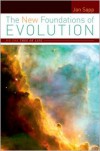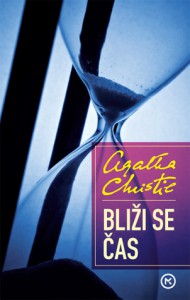Sudoku izazov - Od početnika do majstora
 Meni je OK - nikakva velika otkrića, ali pisano tako da se nauče "pravila" i trikovi rješavanja sudokua.
Meni je OK - nikakva velika otkrića, ali pisano tako da se nauče "pravila" i trikovi rješavanja sudokua.
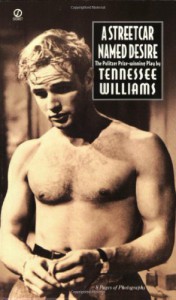 Can't really say that I liked it. Before I read it, I didn't know anything about the context and the times when the play was written. I've done some catching up, but I'm not really that interested. I just read it because of all the references that pop out every once in a while.
Can't really say that I liked it. Before I read it, I didn't know anything about the context and the times when the play was written. I've done some catching up, but I'm not really that interested. I just read it because of all the references that pop out every once in a while.So my take on it is this: Stanley is the personification of the American, the Owner. Looking back on my notes, I see that the rape is insinuated right from the first time Stanley steps on the scene. E.g. "He sizes women up at a glance, with sexual classifications, crude images flashing into his mind and determining the way he smiles at them." Women are objects to be owned, just like a car.
Blanche is insightful, but cannot help herself cope and overcome her own sorrows.
Who I really wanted to find out more about was Stella. She's torn between the sheltered world she had with her parents, and the cruel one where she actually feels sheltered with Stanley at her side. In the end, she sides with Stanley, forcing herself to believe that her sister has lost her mind telling her that Stella's husband raped her while she was in the hospital giving birth to their child.
I guess the reason why a lot of women on goodreads didn't like this is the women's fate in the play. Ending up in an asylum, because getting raped is not as shocking as being promiscuous, and staying with a violent husband because you have nowhere else to go - we really don't want to read about these kinds of worlds, even if it were in 1947, because we know that it's actually happening all around us. And the Stanleys of the world are role-modeled because of their "inner drive", because they will be or are achieving so much.
Title suggests they all act on desire. According to Blanche, desire is opposite to death. I wouldn't agree with either, but that's just me.
The play is all about excessive drama. As I understand, that was actually the point. (?) Anyway, I don't see all the thrill in it, but maybe it's one of those plays you should watch, not read (I'm thinking of watching the movie). But maybe it's just a Marlon Brando thing. (shrugging)
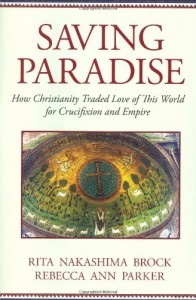 First of all, this was recommended to me by goodreads, and I was really surprised at how much I liked it. Be careful goodreads, my expectations are up!
First of all, this was recommended to me by goodreads, and I was really surprised at how much I liked it. Be careful goodreads, my expectations are up!To mention all the ideas that interested and intrigued me would be like writing this book anew, so I'm just going to note some things that caught my attention.
I loved gluing together bits and pieces of sometimes incoherent fragments of history from I got textbook and novels, following the authors "alternate" take on the history of Western Christianity. Also, it was a refreshing view of Christianity, by authors who speak of feminism, racism, global social and economic justice and the environmental pollution in a way I rarely hear from Christians. I also liked their conclusion: another Christianity is possible.
The search begins with the art in the Christian culture, changing from depictions of a serene paradise to the torture of Crucifixion. (There's a lot to do with visual literacy, which I am not competent to write about.) The narrative unfolds describing the changes in the philosophy of Christianity over centuries, from the early Christians' need for a paradise on Earth because of the prosecutions, and the importance of community, to the institutionalized Church's need to maintain control and position leading to self-sacrificing love sanctioning violence and war - pain and misery in the image of Jesus; next comes the first crucifix depiction with the Saxons, that had one century earlier been mass baptized at the point of sword, along with Church's turn towards violence and the crusades and the inquisition, and the medieval theology of atonement; and finally to the New World and the transformation of religion into a weapon of enslavement and subjugation.
Of course it's much more complicated than this, but it's a long way the authors thread from the Sumerians to Martin Luther King Jr.
The gender view was the bonus for me. There is a lot about gender equality among early Christians - supposedly a tool against the Roman patriarchal system. The authors point out that gospels challenge systems of domination, including gender relationships. (There's also a lot of context that was missing in my religion classes on the teachings of Jesus as resistance to the Roman empire.) They mention also Eve's sin in connection with the humans lowly condition, and discuss all the evil released on women based on the story from the Genesis. There's a mention one interpretation that has been bugging me for a while: acquiring knowledge leads to risks. But that's just an observation, don't have time to go into it right now. I thing this part of the narrative might be a little too simplified to be the truth, but I really appreciate the effort Rita and Rebecca put into their research.
This has also been an eye opener about the USA - it made some contemporary politics and philosophy more connected with their tradition, and showed me how the Puritan legacy poisoned USA to this day. It was also interesting to compare Romans' habit of crucifixion to the relatively recent USA lynching.
What I must object to is the apparent progress from east to west, to America (to be exact, USA); but also progress in general - as the story unfolds, Mediterranean, Europe, Asia and Africa get left behind and there is no more mention of them. Another annoying bit: The pristine beginning is followed by corruption of the truth of differing degrees, with the hope that future brings the salvation. The authors actually write: "However, this [Protestant] tendency forces us to view the past selectively and impose purity upon it rather than to see its fullness, which is as complex, ambiguous, and diverse as any human endeavor ever is." Although they tried to avoid it, I don't think they were successful. Nevertheless, they told an interesting story that kept me engrossed with the book. In all honesty, there were some boring passages/chapters, but the overall felling after reading this is that I've learned a lot and my perspective has shifted, and that's what I appreciate in a book.
Here are some quotes that I remembered:
"There are worse things than dying. One is having to live with the knowledge that you, by your own choice, have surrendered to forces you abhor and been complicit in the destruction of what you most love."
"Whether and how Christians can memorialize Jesus’s crucifixion without fomenting hostility to those who hold to a different faith remains a moral issue for those who participate in such rituals."
"Early Christian teachers condemned private wealth as a basis of exploitation. They insisted that material blessings were gifts of God and must be shared."
"The contemporary Roman Catholic prohibition against women’s ordination is based in the assertion that women cannot reflect the image of Christ."
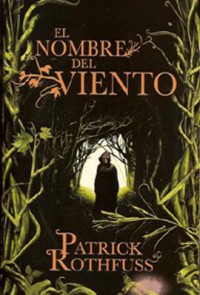 I don't read a lot of fantasy, but this was recommended by my brother, who does, so I supposed it is in the upper half. Can't really say much, I liked it, it was interesting, if only for reading it in Spanish. There's an entire philosophy about storytelling, which I won't go into, and the characters might be a little bit dull, but at the moment I am leaving the 4/5 rating. I have in mind to read the second book, and the third when it eventually comes out. Maybe then I'll be more inspired for a review.
I don't read a lot of fantasy, but this was recommended by my brother, who does, so I supposed it is in the upper half. Can't really say much, I liked it, it was interesting, if only for reading it in Spanish. There's an entire philosophy about storytelling, which I won't go into, and the characters might be a little bit dull, but at the moment I am leaving the 4/5 rating. I have in mind to read the second book, and the third when it eventually comes out. Maybe then I'll be more inspired for a review.
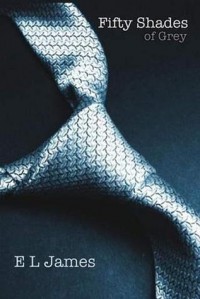 So this goes for the entire trilogy. Ugh. Horrible.
So this goes for the entire trilogy. Ugh. Horrible.(This will be funnier if you've already read the awful books, but I wouldn't recommend it.)
So it's a modern day frog-turns-prince fairytale. All the pretty rich dirty little frog needs is unconditional love, and it's love and hearts and flowers everywhere. Oh, and it's an abusive relationship. But he loves her. Ahhh, heartwarming. If you want to read it just because of all the kinky fuckery, don't. It's not worth over a 1000 pages of reading time. (I can't believe I actually read all of it. Thankfully, I had a cold and didn't go to work, so I finished all of it in 5 days and found my release.) Actually, it's quite vanilla. Just when Anastasia (sorry, Ana) starts loosening up and you think you'll read something interesting, no. That's where the author starts with the cutoff scenes and digresions. Not to mention that the author copy-pasted one sex scene over and over again. The writing style doesn't even deserve a comment.
I had so many OMGs and WTFs in my PDFs that I don't know what to write. I was so annoyed reading the last 200 pages I woke up my roommates. Still, a few examples are in order.
"I make decisions based on logic and facts. I have a natural gut feeling (...)" WTF
"She could be in her late thirties, maybe in her forties. It so difficult to tell with older women." Oh, crapola!
"He has a hotline to my groin." i.e. her inner goddess
"I mutter and take a welcome sip of cool water. Oh my." WTF with the oh-mys
also annoying: every single "men are like that" piece of shitty advice, and repetitions of "his happy trail", "recently fucked hair", "fair point well made", "bare feet", "his eyes darken", "holding me firmly in place", etc.
Also, all the BDSM characters are evil or have had a traumatizing childhood. Very 3D.
The insecurity of those two... Boring.
The ungrateful brat Anastasia from the beginning of her sexual experience usually comes two times when they have sex. And the first time he comes before her, she's unhappy??!! Yeah, you really do love him.
What's with the subconscious and the inner goddess?? It's funny once of twice, not after every sentence Grey says. Rolling my eyes at you, EL James.
And at the end, the story starts all over again but from Mr. CEO's point of view. So what, I am now supposed to re-read all of this because now I know from the start what Grey is like and why and what he might be thinking, so it's double fun?? HELL NO!! (shouty capitals)
Oh, and Mr. Grey, you don't like condoms? Boo-hoo! I don't care. Get a vasectomy.
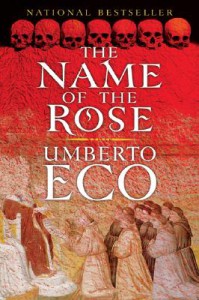 I can't actually say that I liked it, my words were "It was OK", but I still thought it deserved more than 2/5 stars. It was interesting (the philosophical parts), and medieval. That's about it.
I can't actually say that I liked it, my words were "It was OK", but I still thought it deserved more than 2/5 stars. It was interesting (the philosophical parts), and medieval. That's about it.
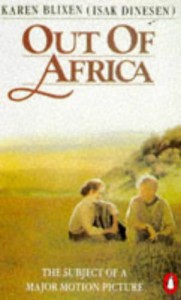 This was a total disappointment. I had heard about the movie, but somehow never got around to watching it. A couple of months ago I found the book, and I make it rule to try to read the book first, as well as judge the book and movie separately. I've still got to watch the movie, but only because I like Meryl Streep.
This was a total disappointment. I had heard about the movie, but somehow never got around to watching it. A couple of months ago I found the book, and I make it rule to try to read the book first, as well as judge the book and movie separately. I've still got to watch the movie, but only because I like Meryl Streep.Right from the start, I hated the colonialist attitude pouring out of the pages. But I was willing to let that slip, since most of the events mentioned and described happened almost a hundred years ago, and I was willing to let the Danish baroness in Kenya have her patronizing way. The too often seen "love-my dogs-more-than-the-natives" attitude. I read reviews of people being touched by the sadness described on having to move back to Europe and leaving everything behind. But in my opinion, leaving Africa was hard on her more because of the loss of her land (and her independency along with it), than because of a loss of home. In general, the relationship of the author to Africa (the continent, the climate, the culture, the people?) seems more like one of an owner, and not of an inhabitant. It seems to me to be a question of possesion, not of belonging.
To sum up, I do not recommend this book. It's packed with sexism, rasism, annoying and insulting generalizations, constant divisions on us and them... Also, the author seems to be asking the reader for compassion, but doesn't disclose any of the really important details of her life - the social position, the illness, the relationship with her male friends, etc. - I found them in the Notes including a short biography. As to the descriptions of Africa, I read more inspiring ones in tedious archeology and anthropology books.
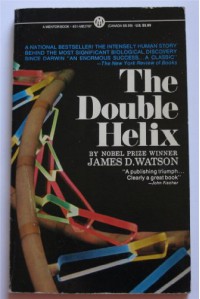 A painful reminder of probably the ugliest episode in the history of modern science. I've read it more than once and I was always stunned at the way Watson describes his colleagues (or anybody else, for that matter). Not a polite person
A painful reminder of probably the ugliest episode in the history of modern science. I've read it more than once and I was always stunned at the way Watson describes his colleagues (or anybody else, for that matter). Not a polite person
The Science and Ethics of Engineering the Human Germ Line: Mendel's Maze
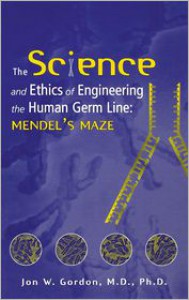 an extremely well written discussion on medical ethics of genetic engineering and reproductive technologies. also deals with the legal aspects of the developing biological sciences, and includes an interesting epilogue "Understanding our biases"
an extremely well written discussion on medical ethics of genetic engineering and reproductive technologies. also deals with the legal aspects of the developing biological sciences, and includes an interesting epilogue "Understanding our biases"
The Intellectual
 Basically, he is (the one and only?) intellectual. Too philosophical to be my cup of tea. Some of his claims seemed reasonable (why Palestinians aren't just terrorists), some weird (racists just promote genetic diversity).
Basically, he is (the one and only?) intellectual. Too philosophical to be my cup of tea. Some of his claims seemed reasonable (why Palestinians aren't just terrorists), some weird (racists just promote genetic diversity). About what an intellectual is like - I would agree with some of these, but all together on a pile? Looks too much like an intellectual is one to always complain, never actually do anything, and never take responsibility for his/hers acts and arguments. It's as if he's trying to be controversial, and at the same time saying a little as possible - and that's what this book is like. Here's a more or less complete list of the duties of an intellectual, with my comments:
goes against the mainstream ideas and thoughts: it doesn't matter that one week he must represent the ideas he fought the last one, he's in it for the chase - ego-tripper;
speaks for ordinary citizens - and how does he know what to speak about?does not offend the one accusing him - not doing a good job of it;
all opinions must be heard - disagree;
must display thought independence: the less material gain you have, the more intellectual integrity you get; the goal is planting the seed of doubt - is that why he's so incoherent?;
must not become a part of the dominant ideology, better to be forgotten by history - so be in the center of attention, but stick to the sidelines;
encourages the unpopular arguments - well that speaks for itself, like "global warming";
encourages mass education, reading newspapers and public debate - in general I would agree that these are all good things, but the cynic in me cannot: like these aren't the place we find most mind-numbing.
Did this just make me an intellectual?
Anyway, something that annoyed me throughout the book: making everybody else look bad is still not making you look good. I agree with some of the stuff on the scientific elites, but only up to a point. That's probably because he annoys me so much - if somebody else said it, I would probably like it.
The most interesting information for me is something mentioned casually: it's the literature-based discovery or Swanson linking, named after Don Swanson, an information scientist.
All in all, I wouldn't recommend it.
P.S. Just found out that he endorses Intelligent Design. Well that sucks. I'm sorry I even read it in the first place.
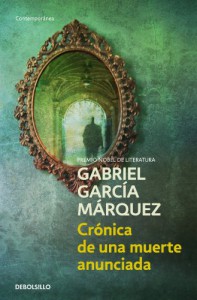 This is the first work of Garcia Marquez that I've read, and I really enjoyed it. I had read an excerpt at my Spanish class, and I immediately knew I would like it. It's a mix of magical realism and a crime novel. It reads fast (I'm waiting for a weekend of bad weather to read it again!) and leaves you wanting more. I really like all the uncertainties woven into the story, it gives it the realistic feeling I've never had before from a book. I really wonder why it took me so long to start reading South-American literature. Now I have a lot of cathcing up to do!
This is the first work of Garcia Marquez that I've read, and I really enjoyed it. I had read an excerpt at my Spanish class, and I immediately knew I would like it. It's a mix of magical realism and a crime novel. It reads fast (I'm waiting for a weekend of bad weather to read it again!) and leaves you wanting more. I really like all the uncertainties woven into the story, it gives it the realistic feeling I've never had before from a book. I really wonder why it took me so long to start reading South-American literature. Now I have a lot of cathcing up to do!
What Darwin Got Wrong
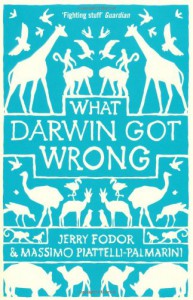 I hate to admit it, but I bought this book because of the covers. I was interested in the theme, but the real reason I immediately bought it and started reading it were the covers.
I hate to admit it, but I bought this book because of the covers. I was interested in the theme, but the real reason I immediately bought it and started reading it were the covers.As the authors put it, it is "an attack on the most influential scientific orthodoxy of the last 150 years". Although at times demanding a lot of attention, there are humorous parts, beginning with the introduction bearing the name "Terms of Engagement" :), as well as the Granny Gravity bit.
The authors claim that there might be something fatally wrong with the theory of natural selection. But please, natural selection, not evolution. I hate going into an argument about a book on the philosophy of biology only to realize that the person I'm talking to doesn't differentiate between evolution and natural selection. Which I also noticed in some reviews. That brings me to the next issue. Apparently, this work got a lot of negative feedback. If I understood correctly, from evolutionary biologists and people obsessed with creationism. Going back to my notes, I went along and downgraded it from 5 to 4 stars. Why? Because I realized there was I lot I didn't understand. I have a ton of notes on this book, and it would take me too long to get into it, but what matters is that I really liked it. After reading other reviews, I thought I should re-read it, because I obviously missed something. Or did they? I've been reading on evolution for the better part of the last ten years, and this book was extremely refreshing. Probably because it wasn't written by biologists. Now I don't consider myself any kind of an authority on these matters, and besides reading, I haven't really had the chance to sort out my standpoints (to myself or others) in a discussion or really breaking down some arguments. Some of the criticism seems "legit", other like they haven't even read the book. But as far as changing your perception goes, this book does it for me. After reading so many of the Darwin's bulldogs' books, it's exciting to start reading Lewontin, as well as non-biologists' takes on these themes in biology - a look from "the other culture" (the humanities one), if you will.
The references are recent (mostly from 2000 to 2009) and they present excerpts from the most up-to-date literature and scientific facts. (Which others call quote picking.) It is really interesting.
I'm just going to add some quotes, and you can think what you like about it. About selfish genes, they quote (somebodys? my notes are not good): "To consider genes as independent units is meaningless from the physiological as well as the evolutionary viewpoint"; "Advocacy of the gene as the unit of selection is operationally incoherent and genetically misconceived". On evolution in general: "Selection involves whole phenotypes, not individual traits"; "Evo-devo revolution has stressed that evolution is essentially the evolution of the arrow that connects the genes and the phenotype." On the intentionality of natural selection: "Darwin thought that he could start with a mental process and then get to natural selection by abstracting the minds away. But that is what we are saying can't be done."; "Fiddlesticks. The human mind wasn't created, and it wasn't designed, and there is nothing that natural selection cares about; natural selection just happens. This isn't Kansas, Toto."
Read it, if only to find new interesting authors. There are other biologists out there besides Richard Dawkins!
P.S. I guess we are all reacting to this book in response to the accumulated annoyances from before. An idea by a Croatian author is that particular stances and positions in the evolutionary theory have a lot to the with the persons' socio-economical background and political affiliations - basically, that everybody sees what they'd like to see. I'm beginning to think it is for the most part true.
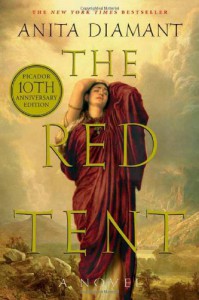 I loved it! I don't buy bestsellers, ever, but this one I bought, and I'm glad. I don't want to tell the story, you can find it on the book covers, but it wasn't about the story what did it for me. It's about what it makes you think about: your mother; yourself (me being a woman); the religions taking the Old Testament as a Holy Book; the Book of Genesis, which I can finally begin to understand, because now I have a context that my religion classes never gave me; the divide between women and men, biological and socially imposed.
I loved it! I don't buy bestsellers, ever, but this one I bought, and I'm glad. I don't want to tell the story, you can find it on the book covers, but it wasn't about the story what did it for me. It's about what it makes you think about: your mother; yourself (me being a woman); the religions taking the Old Testament as a Holy Book; the Book of Genesis, which I can finally begin to understand, because now I have a context that my religion classes never gave me; the divide between women and men, biological and socially imposed.Just one remark: although the red tent works great for the story, menstrual bleeding only during new moon doesn't seem to pass the reality check. Most evidence is anecdotal. Google found a lot of funny new age sites, but the most convincing piece of evidence started with "Haven't you noticed...?". About the Red tents, Moon huts, and other interesting rituals - I'm still not sure whether isolating women during their bleeding helps them or just stigmatizes them - I think that it can also be (/was/is) understood as a way of removing women out of the way while they are "unclean". I know, it's an experience that only women share, blabla, but we live with men, so they better learn to live with us, even when we are menstruating and needing time for ourselves. We do make up for half of the population. Not that I wouldn't like sharing experiences with other women, and this way seems particularly appealing, but why should that be only during "the monthly wash"? Men need to get over their blood complexes, and period isn't something that should be mystified - we've had plenty of that. Just in case any one of you women reading this wants to try it (I just had to paste this here):
Here are 13 ways that you can sync your bleeding with the moon:
1) State the intention out loud or on paper that you want to bleed during the new moon and ovulate at the full moon.
2) Begin by listening to your body and asking it what it needs to do that.
3) Go to bed with the sunset (or before 10pm) and arise with the sun.
4) Eat local food in season.
5) Sleep in a complete darkness during the naturally darkest times of the moon’s phases (new moon).
6) Take moonlight walks at night.
7) Take nature into your body by eating food in the whole form that nature provides.
8) Walk barefoot on the earth etc. (Can someone please explain the etc.?!?!)
9) Plan your activities in flow with the moon`s energies.
10) Create a Moon Lodge with your women friends simply by gathering and creating sacred space together on the new moon (in whatever form that feel sacred for you).
11) Share this wisdom with your women friends (women who spend a lot of time together naturally sync their bleeding -which can work for or against our intention to bleed with the new moon).
12) Attend to your menstrual health with the help of a holistic practitioner. If you suffer from yeast infections, infertility, heavy bleeding, cramps, PMS etc. claim the gift inherent in these health challenges, by using them as a catalyst to transform your life- rather than simply treating or suppressing the symptoms.
13) Avoid foods that contain endocrine disruptors or xenoestrogens such as: growth hormones, food packaged in plastic or BPA cans and bottled water etc.
As you sync up with the natural cycles, notice the impact on your health, energy and overall satisfaction with the rhythm of your life- even adopting just one or two practices daily -can go a long way toward restoring harmony in our bodies and our lives.
Well some of this will definitely help you feel better, but sync-ing to the moon cycles seems to be on a psychic basis, not physical.
